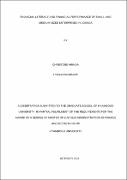| dc.description.abstract | The financial performance of SMEs is a major concern for Uganda with high rates of solvency among these enterprises. Financial literacy has been identified as a one of the key competencies required for the establishing, management and thriving of SMEs. However, the exact effect they have on the financial performance of SMEs hasn’t been fully established by the available literature thus the need for further research in this area. Therefore, basing on the logic of Resource Based Theory, the study sought to examine the effect of financial literacy on financial performance of small and medium enterprises in Ntungamo municipality where it was guided by three objectives that include to analyze the effect of debt management literacy on the financial performance, to assess the effect of book keeping literacy on the financial performance of Small and Medium enterprises in Ntungamo Municipality and to examine the effect of budgeting literacy on the financial performance of Small and Medium enterprises in Ntungamo Municipality. The researcher deployed across sectional survey design where a sample of 97 SMEs was selected using stratified random sampling technique. Responses were collected using a self-administered questionnaire that was comprised of Likert scaled questions. Data collected was analyzed using SPSS version 23.0 where regression analysis was performed to establish the effect between the variables. The study established that bookkeeping literacy (Adjusted R2=0.077, P-value = 0.015) and debt management Adjusted R2= 0.096, P-value =0.007) significantly and statistically affect and predict financial performance of SMEs. However, the effect of budgeting literacy positively but insignificantly affects financial performance at p= 0.169 which is more than 5% level of significance. In general, the study found out that financial literacy positive affect financial performance and its effect is significant (p-value= 0.025, Adjusted R square= 0.116) at 5% level of significance. The study concludes that financial literacy significantly affects financial performance of SMEs and recommends that government and other development partners should institute financial literacy training programs and owners should follow separate ownership from business actives and therefore employ people with necessary knowledge to run their operation. The study further suggests that further research on other dimensions of financial literacy like savings, accountability, investment so as to make a generalization of effect of financial literacy on the financial performance of SMEs | en_US |

